
How generative AI elevates customer engagement in B2C manufacturing and retail
Most industry leaders, specifically manufacturers and retailers recognize the immense strategic value of optimized marketing messages and streamlined customer service to thrive in a competitive market. Research shows that 81% of customers are more likely to make repeat purchases after a positive customer service experience, while 72% respond favorably to marketing messages tailored exclusively to their preferences.
However, manufacturers grapple with translating complex product features into customer-friendly language and resolving feedback and assembly issues through overwhelmed call centers. Meanwhile, retailers face challenges crafting distinctive messaging for comparable products and providing personalized service amidst long wait times and overburdened agents.
Enter large language model (LLM)-powered generative AI–the promising solution that can tackle these challenges head-on. By analyzing data and creating compelling content, generative AI empowers manufacturers and retailers to deliver personalized and optimized customer experiences.
But bridging the gap between potential and reality demands expertise. This is where Grid Dynamics, a leader in deploying enterprise AI solutions with extensive experience in data science and AI, excels as your trusted partner. Our generative AI experts have formulated various practical applications to optimize marketing messages and enhance customer service in manufacturing, retail, and beyond.
Generative AI for B2C: Challenges and solutions
Discover how we can enhance your brand's value in the competitive market through optimized marketing and seamless customer service.
Product attribution
Retail and manufacturing brands need to transform technical product attributes and specifications into engaging descriptions that resonate with customers. Not only do they invest countless hours and millions of dollars into high-fidelity catalog attribution to enable quality search and faceted navigation for enhanced user experience but also spend considerable effort harmonizing attributes and organizing their catalog data for internal consumption and data feeds for 3rd party service providers and partners. Despite this, proper product attribution remains a major challenge for most companies.
Grid Dynamics provides a revolutionary solution that leverages LLMs to analyze, harmonize, and enrich product data. Our approach enables retailers and manufacturers to maximize the potential of their available product data, resulting in increased data fidelity and enhanced customer experience. This helps optimize their catalog management processes and improve overall operational efficiency.
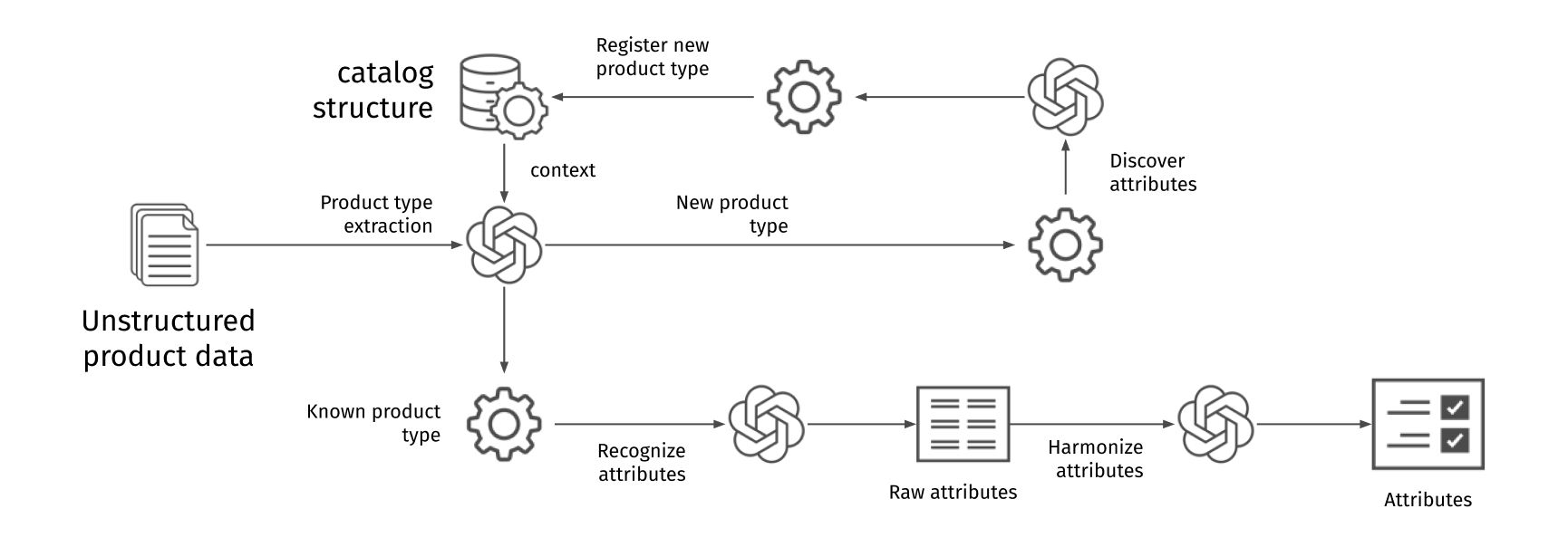
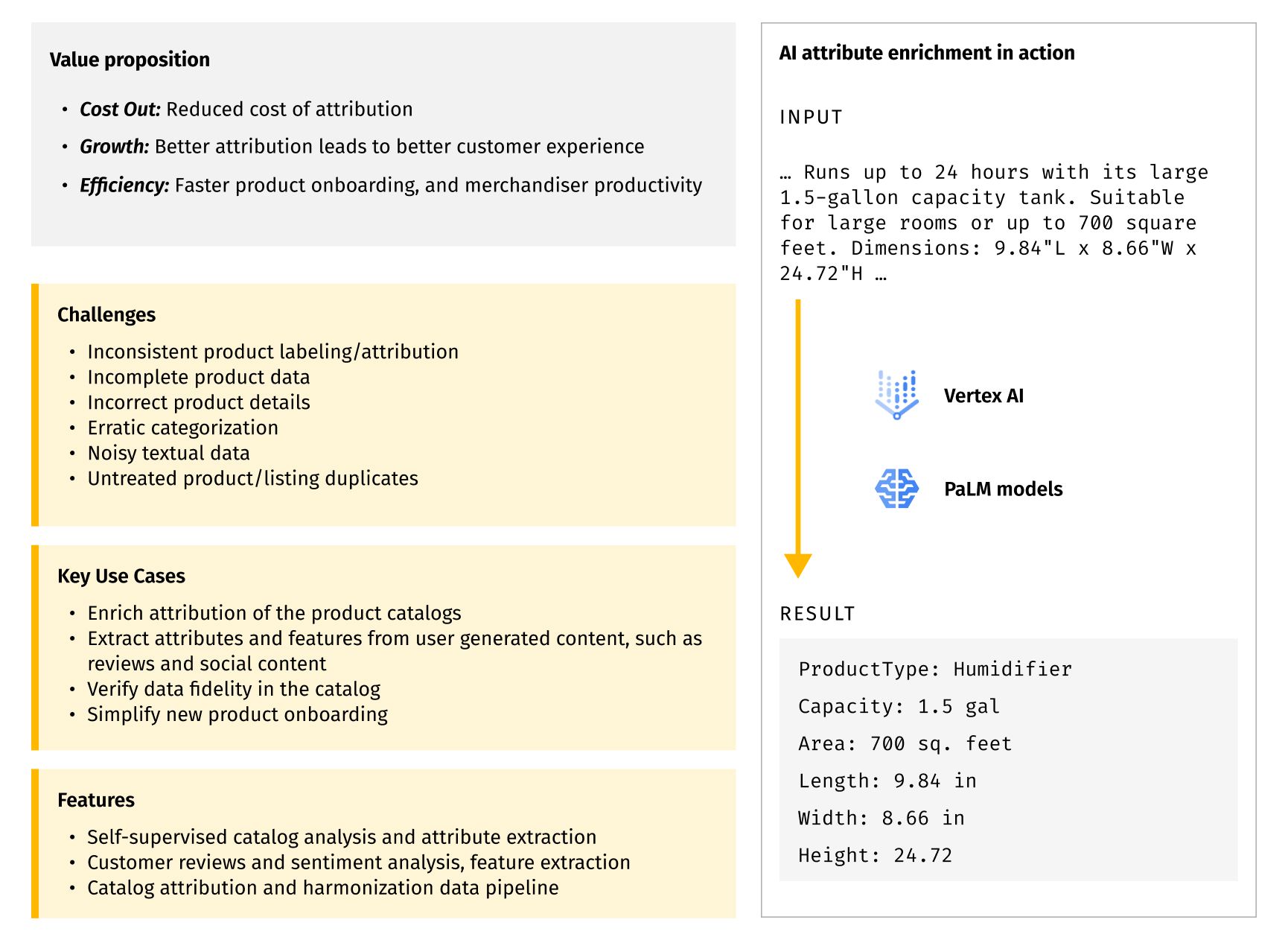
As an example, imagine a machinery manufacturer with a complex catalog of products and attributes. Our solution analyses catalog data to ensure consistency and easier data organization while enriching product attributes with information from technical documents and customer feedback. This enhances the existing attributes, providing a more detailed and accurate representation of each product. The benefits are twofold. Manufacturers improve internal operations, enhancing inventory management and production planning. Additionally, data feeds shared with partners become more accurate, resulting in improved supply chain efficiency.
For retailers, proper product attribution is a game-changer on marketplaces. It elevates their presence, leading to improved discoverability, enhanced customer trust, and increased sales potential. The accuracy and detail of attributes optimize search results, drive higher conversions, and grant a competitive edge in dynamic online marketplaces.
Product titles and descriptions
Creating captivating product titles and descriptions that effectively convey a brand's identity, resonate with customers, and incorporate personalized elements can drastically improve sales. However, transforming technical product attributes and specifications into engaging descriptions remains a challenge for many retail, industrial manufacturing, and CPG brands.
Our solution leverages the power of LLMs to tackle these challenges head-on. Brands can automate the process of generating compelling and consistent product titles and descriptions, saving time and effort while enhancing their marketing messages to capture the brand's luxurious and sophisticated image.
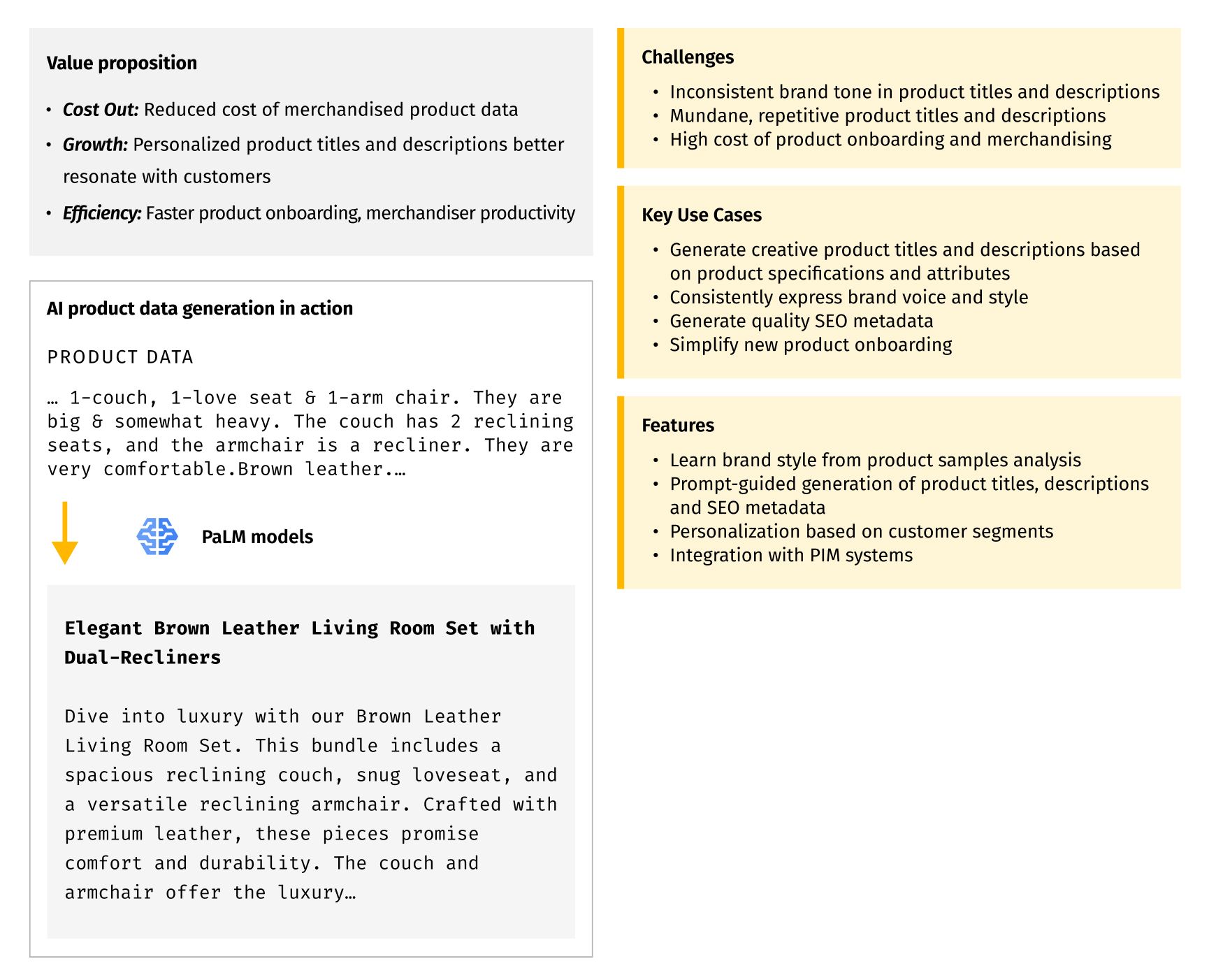
Let's consider manufacturing and CPG companies that produce high-end furniture and hair products respectively. Instead of a mundane description like "Wooden Chair with Cushion," our LLM-based solution can create a captivating product title like "Elegant Oak Chair with Plush Velvet Cushion - Perfect Blend of Comfort and Style." Additionally, LLMs enable the personalization of product descriptions for different marketing contexts. For instance, the same chair can be described as:
- "Luxurious Seating Solution for Classy Living Rooms" in a home decor catalog, and as
- "Ergonomic and Durable Chair for Office Professionals" in a B2C marketing campaign.
Similarly for a CPG company, instead of an ordinary product description like "Organic Shampoo with Aloe Vera," our LLM-based solution can create an enchanting product title like "Revitalizing Botanical Bliss Shampoo with Nourishing Aloe Vera Extract." Moreover, LLMs enable personalized product descriptions for various marketing contexts. For instance, the same shampoo can be described as "Gentle Daily Care for Luscious Locks" in a beauty and wellness catalog, and as "Sulfate-Free Formula for Sensitive Scalps" in a targeted ad campaign for individuals with specific haircare needs. This versatility enhances customer engagement and ultimately drives sales.
Conversational AI for customer service
Consider a B2C manufacturing company that produces a wide range of industrial machinery and equipment. Their customer service center receives numerous calls daily from clients seeking technical support, troubleshooting assistance, and product information. However, the agents often face challenges in providing quick and accurate responses due to the complexity of the products and the vast amount of technical documentation required to address customer queries effectively. As a result, customers experience lengthy wait times and sometimes receive incomplete or delayed information, leading to dissatisfaction. This issue also applies to other B2C industries where customers reach out to service centers for complaint logging, logistical questions, or other similar challenges.
To address these issues, we propose a conversational AI system that industry leaders introduce in their customer service centers. The AI system is designed to act as a collaborative partner to human agents, streamlining issue tracking, and rapidly sourcing answers from product catalogs and technical documents.
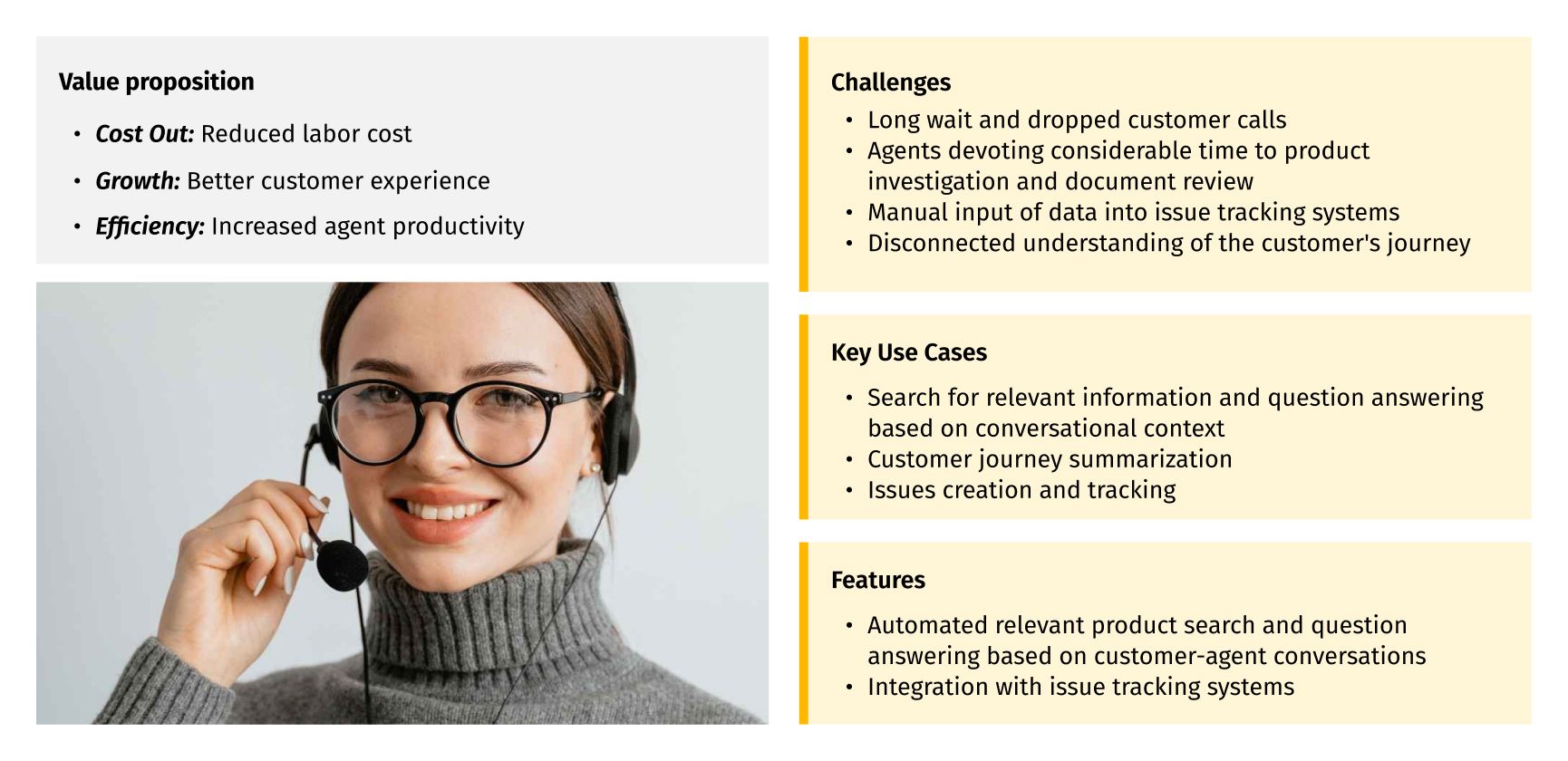
For example, a customer calls the service center with a technical issue related to a specific piece of industrial machinery they purchased recently. The agent uses the conversational AI system by providing a brief text prompt or the product's model number. The AI system then retrieves detailed information about the product's specifications, operational manuals, and troubleshooting guides from the company's database. In a retail setting, if a customer inquires about expediting the delivery of their ordered product, the AI assistant can swiftly access up-to-date logistics data, enabling the agent to respond promptly and accurately while also suggesting the applicable charges, if any.
Moreover, with the conversational AI system storing customer interaction history, agents efficiently address current issues and offer tailored solutions. Implementing conversational AI enhances agent productivity, providing real-time access to crucial information for faster and more accurate support. Reduced waiting times lead to increased customer satisfaction and positive feedback.
Conversational product discovery and selection
In retail and B2C manufacturing, customers often have to sift through a vast amount of information, including product descriptions, specifications, reviews, and FAQs, to make informed purchasing decisions. Existing attempts to address this issue using digital shopping assistants have resulted in a robotic and impersonal customer experience. Departing from the ideal scenario often leads to confused chatbots that struggle to maintain context and provide meaningful assistance.
Grid Dynamics introduces LLM-based shopping assistants specifically designed for optimized product discovery and search. These assistants understand the nuances of human language, comprehensively analyzing product information from reviews to specifications, offering valuable general knowledge insights, and adapting to customer moods and context for a personalized and seamless shopping experience.
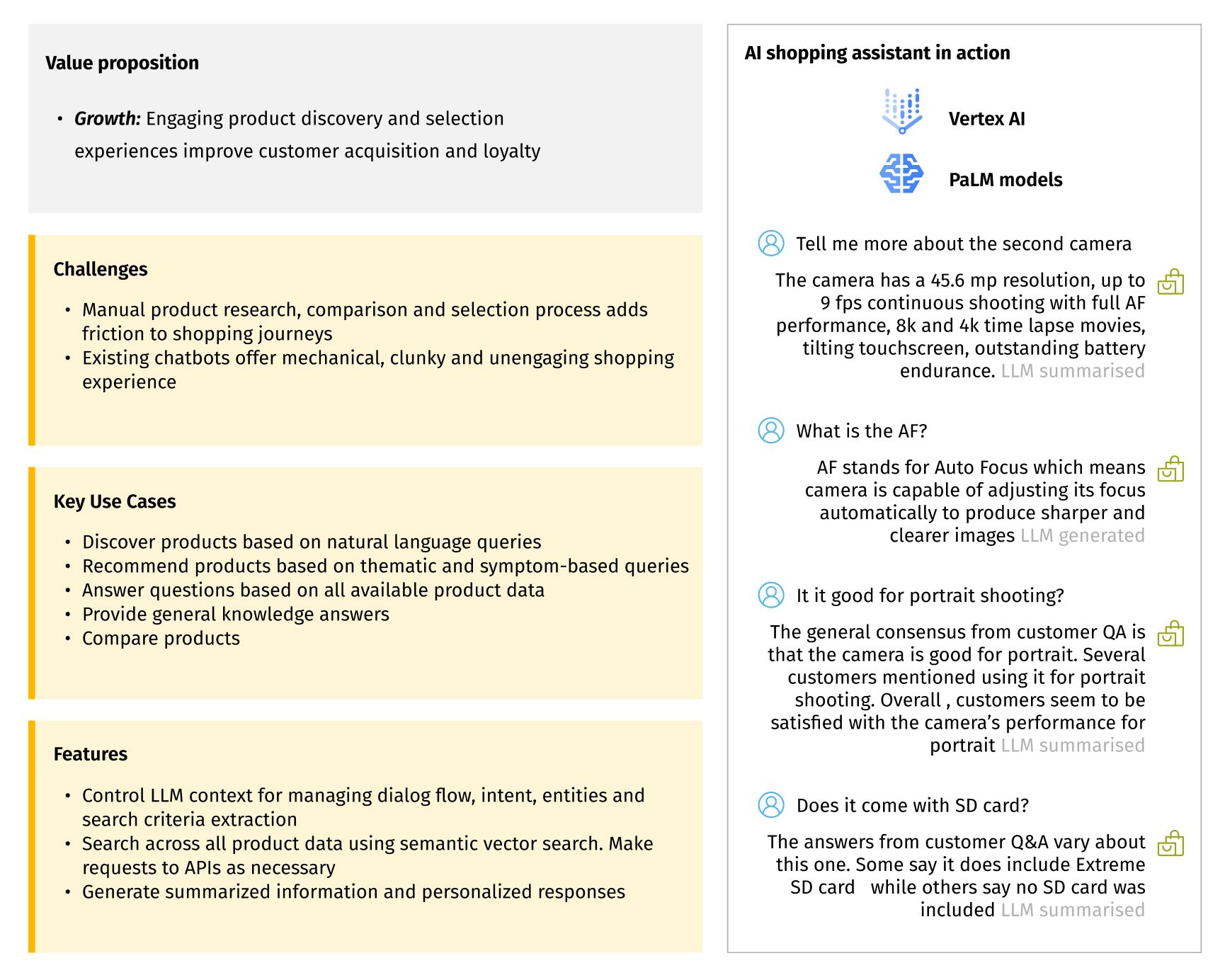
For example, let's consider a customer who is searching for a specific forklift. They have certain requirements in terms of power, capacity, and desired features. With the help of an LLM-based shopping assistant, the customer can simply describe their needs in natural language. The assistant will not only comprehend the customer's requirements but also analyze product descriptions, specifications, and reviews to identify the most suitable options. It can provide detailed information about each product, highlighting key features, customer ratings, and any additional relevant information to aid the customer's decision-making process.
The shopping assistant can also adapt to the customer's mood and context. For instance, if the customer expresses a preference for energy-efficient options, the assistant prioritizes and recommends products that align with their sustainability criteria. The assistant engages conversationally, enabling customers to ask questions, seek clarifications, and receive personalized recommendations for their specific needs. This eliminates confusion and facilitates informed purchasing decisions.
Conversational knowledge assistant
Managing vast amounts of internal documents and unstructured data can be challenging for businesses across retail, financial services, manufacturing, pharma and more. This often leads to knowledge gaps and operational inefficiencies. Moreover, the process of training and onboarding new employees can be time-consuming and complex, requiring them to sift through extensive information to find answers to their questions or gain a comprehensive understanding of company procedures, policies, and culture.
Our LLM-powered conversational knowledge assistant solution is here to support enterprise knowledge management and new employee training by providing a natural language interface that enables seamless access to company documents. Through semantic vector search capabilities, the assistant intelligently retrieves relevant data based on a deep understanding of the content. The assistant also summarizes pertinent information and provides answers to specific questions, further enhancing the employee's learning experience.
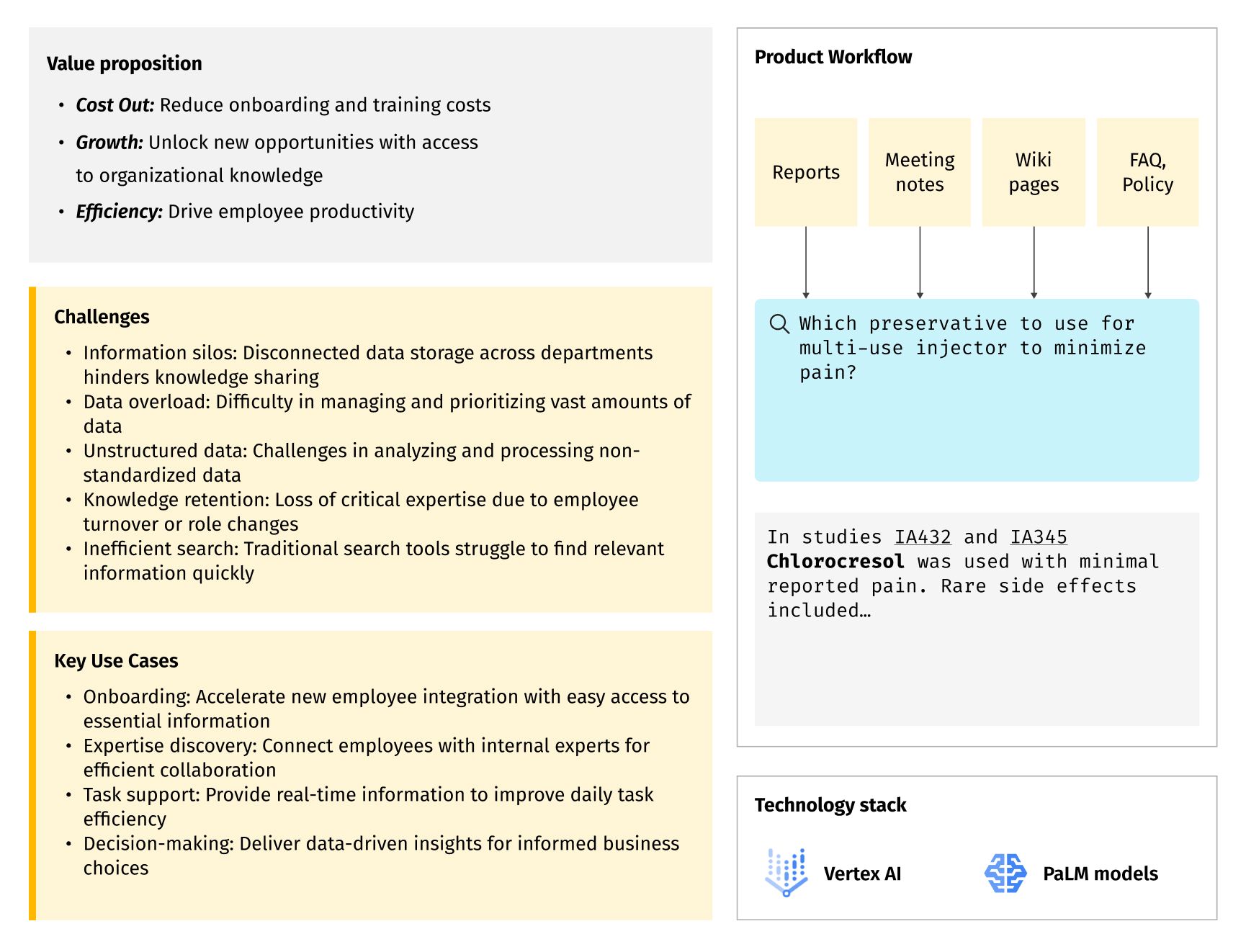
As an example, imagine a research scientist employed by a drug manufacturer, tasked with developing a new drug formulation. This scientist requires swift access to relevant scientific literature and up-to-date clinical trial data to facilitate their research. With a conversational knowledge assistant powered by LLMs, natural language queries like "Latest clinical trial results for drug XYZ?" efficiently retrieve crucial information, enabling informed decisions and advancing pharmaceutical research.
In manufacturing, a new employee can ask the LLM-powered conversational knowledge assistant for safety procedures on heavy machinery, gaining immediate access to essential information and facilitating informed decision-making. Existing employees also benefit from reduced knowledge gaps and improved task efficiency with seamless access to critical data.
Get ready to lead the market with personalized market and customer service
Optimized marketing messages and superior customer service play a pivotal role in bridging the gap between product and consumption in manufacturing and retail, directly impacting sales. The promising potential of generative AI and large language models offer personalized experiences, addressing these challenges in today's competitive market.
To leverage the power of generative AI for B2C, businesses must foster a data-first culture and establish infrastructure for real-time data collection, enabling accurate decision-making across the value chain. Although achieving data sophistication takes time, marketers and customer service professionals must persevere in error elimination and explore generative AI's possibilities with tailored datasets and robust logic.
As a leader in deploying enterprise AI solutions with profound expertise in generative AI, Grid Dynamics is your reliable partner to elevate your brand's value and reshape customer interactions. Embrace generative AI with us to lead the industry with innovation, unlocking new levels of marketing excellence and customer satisfaction.
Contact us today and embark on a transformative journey toward AI-driven success.

